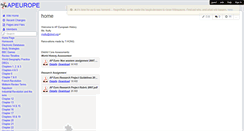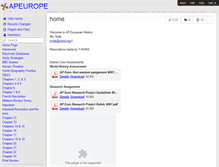APEUROPE - home
OVERVIEW
APEUROPE.WIKISPACES.COM TRAFFIC
Date Range
Date Range
Date Range
LINKS TO WEBSITE
WHAT DOES APEUROPE.WIKISPACES.COM LOOK LIKE?



APEUROPE.WIKISPACES.COM SERVER
BROWSER IMAGE

SERVER SOFTWARE
We observed that this domain is employing the nginx operating system.HTML TITLE
APEUROPE - homeDESCRIPTION
Skip to main content. Try Wikispaces Classroom now. Brand new from Wikispaces. Chapters 1, 2, and 3. Chapters 4 and 5. Chapter 7 and 8. Industrial Revolution and the isms. Chapters 14 and 15. Chapters 18 and 19. Welcome to AP European History. Renovations made by T-HONG. AP Euro- Non western assignment 2007.pdf. AP Euro Research Project Guidelines 2007.pdf. AP Euro Research Project Rubric 2007.pdf. Get a Voki now! Help on how to format text. Turn off Getting Started.PARSED CONTENT
The domain apeurope.wikispaces.com has the following on the web site, "Chapters 1, 2, and 3." I observed that the webpage also said " Industrial Revolution and the isms." They also stated " Welcome to AP European History. AP Euro- Non western assignment 2007. AP Euro Research Project Guidelines 2007. AP Euro Research Project Rubric 2007. Get a Voki now! Help on how to format text."ANALYZE OTHER DOMAINS
The easiest way to manage your class. Commercial Revolution and Emergence of Territorial States. French Revolution, Napoleon, and Congress of Vienna. World War I and Between Wars. World War II and Its Aftermath. PREPARING FOR THE AP THEMATIC ESSAY. You will notice that each essay is followed by a THESIS image and an OUTLINE image.
Get your brand new Wikispaces Classroom now. The first semester of AP European History has taken us through four major centuries. During the 15th-18th centuries, the foundations of modern Europe were laid. It is during these centuries that the countries of Europe shook off their medieval past and began to dominate global affairs. In the following pages, each group has been given a century to thoroughly re-investigate and make come alive.
Friday, June 3, 2011. That is 65 out of 80. Role of Japan in WWI. What England got after the end of 7 years war. What african countries were controled by who. Friday, April 15, 2011. Sunday, April 10, 2011. Monday, April 4, 2011.
A various assortment of assignments for my Advanced Placement European History course. Tuesday, 3 May 2011. Peter the Great and Catherine the Great. Scientific developments after the Scientific Revolution. Agriculture, 18th century Agricultural Revolution. Bolsheviks and the Russian Revolution. Post-war WW2 and Nazi party ideals. Colonialism and Imperialism after the Age of Exploration.